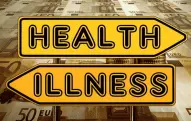Gluten free diet- is it worth the hype?
We've all seen the gluten-free labels in supermarkets and cafes or know someone who is "gluten-free" at the moment for the health benefits.
But is a gluten-free diet really worth all that effort?
A recent article by Dr. Norelle Reilly at Columbia University outlined the facts and fiction behind this new health trend, which may surprise you.
Gluten is a part of wheat and is added to bread products to make them more elastic.
A gluten free diet is critical for someone who suffers from wheat allergies or celiac disease.
Celiac disease is an autoimmune disease. This means that people's immune system attacks themselves by mistake; normally the immune system attacks bacteria or viruses that enter the body and cause disease. In celiac disease when gluten is eaten, the immune system attacks the cells that are in the intestine causing health problems.
There is currently no treatment for celiac disease and so a gluten free diet is the only way to stop the painful and sometimes very serious effects of this malady.
"Children who are experiencing symptoms from gluten warrant medical attention to test for celiac disease to exclude other causes of these symptoms, provide appropriate dietary guidance, and periodically monitor the child for appropriate nutritional intake" says Dr. Reilly.
However, research shows that the vast majority of people who buy gluten free products do not suffer from celiac disease. Instead they buy the products because they believe it to be a healthier option.
Due to the spread of the gluten-free fad, the industry had an estimated $11.6 billion in sales in 2015, a hefty growth rate of 136% from 2013.
One of the biggest misconceptions with gluten free diets is that it is a healthy lifestyle and has no disadvantages. In fact, as the study indicates, the opposite is true for people on a gluten-free diet who do not have celiac disease or a wheat allergy and do not have the guidance of a professional nutritionist.
This is because gluten-free food does not have added nutrients like vitamin B or iron, which many non-gluten free foods contain. A lack of these key nutrients as well as the increased amount of fat and sugar that are added to gluten-free products can lead to problems such as obesity and diabetes.
Besides these health issues, there are also economic costs associated with being on a gluten free diet when you don't need to be. This is because the price tag attached to gluten-free products is much higher than non-gluten free foods.
As Dr. Reilly has stated "The take-home point is that families should be properly informed as to the nuances of this diet and the potential significance of gluten-related symptoms, and should discuss any other dietary changes with their physician before making the shift."
A gluten-free diet has many myths attached to it, with numerous celebrities following the trend. However, as this study shows, separating the facts from the fiction provides a valuable insight into the health benefits of "fad" diets.
Image credit: www.unsplash.com (Olenka Kotyk)














































